New Uzbekistan: human rights and parliamentary elections[Over]  A.Kh. Saidov,
A.Kh. Saidov,
First Deputy Speaker of the Legislative Chamber of the Oliy Majlis of the Republic of Uzbekistan, Director of the National Center of the Republic of Uzbekistan for Human Rights
The modern economic and democratic systems are designed to uphold the rights and freedoms of every individual. As is widely acknowledged, there is no universal model for democratic development; it must evolve based on each country's unique conditions and the needs of its people, avoiding rigid formulas. READ MORE
Important Migration Agreement Signed Between Uzbekistan and Germany[Over] 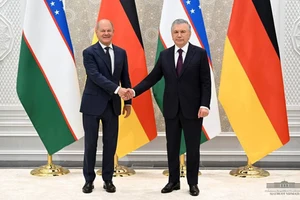 On the invitation of President of the Republic of Uzbekistan, Shavkat Mirziyoyev, Federal Chancellor of the Federal Republic of Germany Olaf Scholz arrived in Uzbekistan for an official visit on September 15. On the invitation of President of the Republic of Uzbekistan, Shavkat Mirziyoyev, Federal Chancellor of the Federal Republic of Germany Olaf Scholz arrived in Uzbekistan for an official visit on September 15.
In recent years, labor migration has emerged as a promising area of cooperation with Germany. At the same time, multifaceted and mutually beneficial relations in the field of healthcare are also developing consistently. READ MORE
The state and civil society in New Uzbekistan are consolidating efforts to combat corruption[Over]  Umida Tukhtasheva, Umida Tukhtasheva,
Deputy Director of the Anti-Corruption Agency of
the Republic of Uzbekistan, LL.D., Professor
Over the years of independence, the role of civil society in Uzbekistan has become increasingly important. The representatives of civil society are not only involved, but also actively take the initiative in the life of society and the state. This role has manifested itself more and more clearly in the fight against corruption. There is no doubt that corruption and society are incompatible. The prerequisite for a prosperous society is a life free of corruption. And all the necessary foundations must be laid for this, which is primarily the task of the state. READ MORE
- September 30, 2024 16:03PM
What does Azerbaijan’s “shift to the East” mean for the South Caucasus?[Over]  By Yeghia TASHJIAN, Beirut-based regional analyst and researcher, columnist, "The Armenian Weekly” By Yeghia TASHJIAN, Beirut-based regional analyst and researcher, columnist, "The Armenian Weekly”
On August 29, 2023, in my article “What does the expansion of BRICS mean for the South Caucasus?” I argued that Iran’s accession to BRICS and the integration of the region’s infrastructure into the International North-South Transport Corridor (INSTC) would similarly increase pressure on Armenia and Azerbaijan to join the bloc. The post-2020 regional status quo and the war in Ukraine have opened the path for new Eurasian actors such as India and China to exert their influence on the South Caucasus. Azerbaijan is the main beneficiary of this development. Positioned strategically along the North-South and East-West transport corridors, Baku has capitalized on its position to become a pivotal transportation and logistics hub in Eurasia. This has caught the attention of China amid the geopolitical shifts that took place in the South Caucasus in light of the second Artsakh (Nagorno-Karabakh) and Ukraine wars.
READ MORE
- September 13, 2024 08:15AM
What Is Next in Armenia–Turkiye Relations?[Over]  By Benyamin POGHOSYAN, PhD, Chairman, Center for Political and Economic Strategic Studies By Benyamin POGHOSYAN, PhD, Chairman, Center for Political and Economic Strategic Studies
The relationship between Armenia and Turkiye has a significant influence on the geopolitical landscape of the South Caucasus. The Turkish blockade of Armenia and refusal to establish diplomatic relations, coupled with the Nagorno-Karabakh conflict, have restricted Armenia’s ability to pursue a more flexible foreign policy, effectively binding it to an alliance with Russia. Normalizing relations with Azerbaijan and Turkiye would allow Yerevan to explore foreign and defence policy alternatives beyond its reliance on Russia. The United States has persistently advocated for Armenia–Turkiye normalization, viewing this as an essential step in untangling the post-1994 status quo in the South Caucasus, which is marked by Russian dominance through its military and economic presence in Armenia. Washington has actively engaged in many efforts, including track 1, track 1.5, and track 2 diplomacy, with initiatives such as the Turkish-Armenian Reconciliation Commission and the 2008–2009 “football diplomacy” serving as notable examples.
READ MORE
- September 6, 2024 09:32AM
New powers of the parliament of the New Uzbekistan[Over]  Akilov Alimjon Rakhimovich, Akilov Alimjon Rakhimovich,
Chief Researcher of Department of analyzing the effectiveness of constitutional construction and public administration of Institute of Legislation and Legal Policy under the President of the Republic of Uzbekistan, doctor of legal sciences, professor
The year 2016 for Uzbekistan was marked by the beginning of a fundamentally new in essence and content stage of state and social construction, in which the main strategic goal was proclaimed - the construction of a New Uzbekistan, based on the values that served the greatest flourishing of our statehood in the 9th-10th centuries (known in world history as First Eastern Renaissance) and XIV-XV centuries (Second Eastern Renaissance). As in previous periods, the basis and priorities of the Third Renaissance of our statehood are the development of science and modern technologies, which are intended to become drivers of dramatic development of the country’s economy, a radical improvement in the well-being of the people and the prosperity of the nation. READ MORE
Uzbekistan’s renewed electoral system a key factor in the advancement of representative democracy[Over]  Shuhrat Bafayev, Shuhrat Bafayev,
Chairman of the Committee for Democratic Institutions, Nongovernmental Organizations and Citizens’ Self-Government Bodies, Legislative Chamber of the Oliy Majlis of the Republic of Uzbekistan
Over the years of independent development Uzbekistan firmly guided by the principles of universal, equal and direct suffrage in secret voting, has progressively implemented international electoral standards into its electoral legislation. In 2017, in his first Address to the Parliament, the President of Uzbekistan Shavkat Mirziyoyev suggested that the current national electoral legislation does not ensure its harmonization and proposed to develop an Electoral Code that meets international norms and standards. Thus, the Electoral Code was adopted in 2019, incorporating more than 30 new democratic norms for organizing and conducting election processes. The approval of the Code marked the dawn of a new stage in the development of representative democracy in the country. READ MORE
The awakening lion: the era of renewal[Over] 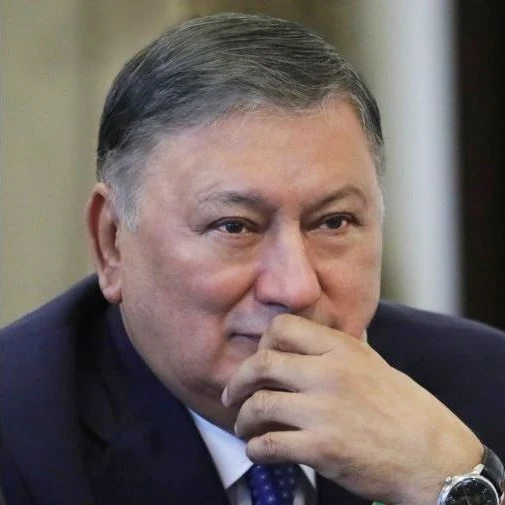 Hey, great Turan, land of lions! Hey, great Turan, land of lions!
What has become of you? What are these days you endure now?
Oh, glorious cradle of Genghis, Timur, Oghuz, and Attila!
Where have the esteemed seats you once held gone?..
Abdurauf Fitrat
An American politician once said of the current life and fate of the Central Asian region: ‘They are neither post-Soviet nor post-communist countries now’.
Today no specialist knowledge is needed to understand this idea, which suggests that such labels are outdated in the research community. For example, ten to fifteen years ago the political behaviour of Central Asian societies – neighbours for thousands of years – was prone to national separatism, mutual dislike and latent hostility, but today they have undergone a remarkable transformation. Ideologues and ordinary Central Asians only a couple years ago endeavoured to prove their superiority, their antiquity and, for these very reasons, their greater belonging to the historical and cultural heritage of the region. Though they still might hurl some sharp insults at each other, now they have become united neighbours.
READ MORE
UNESCO General Conference to be held in Samarkand, Uzbekistan[Over] 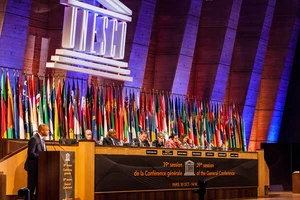 The 43rd UNESCO General Conference is scheduled to take place in Samarkand in 2025. The 43rd UNESCO General Conference is scheduled to take place in Samarkand in 2025.
This marks the first time Uzbekistan will host the biennial event. Historically, these conferences have primarily been hosted at UNESCO's headquarters in Paris since 1986. However, there have been eight exceptions, with meetings held in cities like Mexico City (1947), Beirut (1948), Florence (1950), Montevideo (1954), New Delhi (1956), Nairobi (1976), Belgrade (1980), and Sofia (1985).
READ MORE
Azerbaijan Strengthens Trilateral Cooperation With Pakistan and Türkiye[Over]  By Vasif HUSEYNOV, PhD, Head of Department, AIR Center, Adjunct Lecturer, ADA and Khazar Universities, Baku By Vasif HUSEYNOV, PhD, Head of Department, AIR Center, Adjunct Lecturer, ADA and Khazar Universities, Baku
On July 11 and 12, Azerbaijani President Ilham Aliyev paid a state visit to Pakistan to bolster bilateral ties with Islamabad. The visit came less than two weeks after Aliyev’s meeting with Pakistani Prime Minister Muhammad Shehbaz Sharif and Turkish President Recep Tayyip Erdogan for their first-ever trilateral summit. The meeting took place on the sidelines of the Shanghai Cooperation Organization summit on July 3 in Astana and was a significant milestone in elevating their tripartite cooperation from parliamentary and ministerial levels to state leadership. Both Aliyev’s visit to Islamabad and the trilateral summit of Azerbaijan, Pakistan, and Türkiye highlight the three countries’ commitment to expanding their trilateral trade and transit cooperation, as well as better integrating their military capabilities and defence production.
READ MORE
What drives Azerbaijani obsession with the Armenian Constitution?[Over]  By Benyamin POGHOSYAN, PhD, Chairman, Center for Political and Economic Strategic Studies By Benyamin POGHOSYAN, PhD, Chairman, Center for Political and Economic Strategic Studies
Since the end of the Second Nagorno-Karabakh War in 2020, Armenia and Azerbaijan have been engaged in negotiations to sign a peace agreement. The process seems like a roller coaster of extreme ups and downs, reflecting the volatile and unpredictable nature of the discussions. Several times, the sides have seemed close to reaching a deal only for an unexpected circumstance to arise, causing a significant reversal during the peace talks. In late 2022, after intensive negotiations in Washington and Prague, Azerbaijan refused to appear in Brussels and instead launched a blockade of the self-proclaimed Nagorno-Karabakh Republic. Azerbaijan did the same at the end of 2023, when despite mounting hopes for an imminent agreement President Aliyev refused to attend the European Political Community (EPC) summit in October 2023 in Granada and the trilateral Armenia–Azerbaijan–European Union summit in Brussels.
READ MORE
The Current Stage of Armenia–Azerbaijan Negotiations[Over]  By Benyamin POGHOSYAN, PhD, Chairman, Center for Political and Economic Strategic Studies By Benyamin POGHOSYAN, PhD, Chairman, Center for Political and Economic Strategic Studies
Following the military takeover of Nagorno-Karabakh by Azerbaijan in September 2023 and the forced displacement of Armenians, Azerbaijan has pursued a double-pronged strategy in negotiations with Armenia. Its first approach has been to undermine Western-led Brussels and Washington negotiation formats while showing an interest in resuming negotiations on the Moscow or regional platform. President Ilham Aliyev cancelled participation in the Granada summit of the European Policy Community in October and the scheduled tripartite meeting in Brussels facilitated by the European Council president, Charles Michel. In November, Azerbaijan rejected the United States’ offer to resume negotiations with foreign ministers in Washington. Baku explained its decision by claiming that the European Union, France, and the US have a pro-Armenian or anti-Azerbaijani stance. Simultaneously, Azerbaijan has several times expressed its readiness to resume negotiations in Russia or on regional platforms.
READ MORE
The Last Hurdle to the Armenia-Azerbaijan Peace Treaty Should be Overcome[Over]  By Vasif HUSEYNOV, PhD, Head of Department, AIR Center, Adjunct Lecturer, ADA and Khazar Universities, Baku By Vasif HUSEYNOV, PhD, Head of Department, AIR Center, Adjunct Lecturer, ADA and Khazar Universities, Baku
A long road has been passed since Armenia and Azerbaijan were fighting a violent war that erupted in the wake of the deadlock in the peace negotiations for around three decades. As President Ilham Aliyev of Azerbaijan rightfully said, the chance for peace was eventually brought about by the war in 2020 that put an end to the occupation of the Azerbaijani territories. Having liberated its occupied territories, Azerbaijan immediately initiated a peace treaty with Armenia based on the fundamental principles of international relations, including mutual recognition of each other’s territorial integrity and non-use of force. It is a telling fact that Azerbaijan put forward this initiative in March 2022, when the Armenian separatist regime still had some control over the parts of the Karabakh region where Russia’s peacekeeping mission was temporarily deployed. This clearly manifested Baku’s intention to peacefully reintegrate the Armenian population in the Karabakh region and diplomatically resolve the remaining disputes with Armenia.
READ MORE
Uzbekistan: civil society institutions — a bridge between society and state[Over]  Anvarjon Mirkomilov, Head of Department Anvarjon Mirkomilov, Head of Department
Development Strategy Center
Today, civil society institutions, particularly non-governmental non-profit organizations (NGOs), play an active role in Uzbekistan's development and the implementation of the “Uzbekistan – 2030” strategy. It is impossible to build a new Uzbekistan without organizing the activities of NGOs, the most important institution of civil society, according to democratic principles. On this basis, effective work is being done to support NGOs and civil society institutions, strengthen social partnerships with state bodies, implement effective public oversight, and improve the legal framework governing this area.
READ MORE
Shavkat Mirziyoyev: “I devote my life to the Uzbek Nation”[Over] 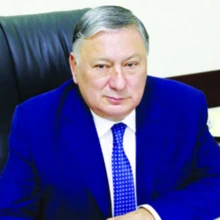 Qudratilla Rafikov,
Political scientist Qudratilla Rafikov,
Political scientist
In the speech of our President at a recent meeting with activists of Jizzakh region, one point caught the attention of most of the people. In it, the head of state said the following:
"If God gives me health and life, the days will come when we will not have poverty and unemployment. I have devoted seven years of my life to this, created a system for this, created laws, opened the world. I came to this position, so that my people would live well, so that their dreams would come true, so that their children would live in prosperity and be happy, so that their grandchildren would be born healthy, so that medicine would work, schools would work, roads would be smooth...".
READ MORE
The anatomy of the current protests in Armenia[Over]  By Benyamin POGHOSYAN, PhD, Chairman, Center for Political and Economic Strategic Studies By Benyamin POGHOSYAN, PhD, Chairman, Center for Political and Economic Strategic Studies
Armenia is still absorbing the implications of the protests that overwhelmed Yerevan on May 9. On April 19, 2024, the Armenian and Azerbaijani border delimitation and demarcation commissions signed the protocol on the delimitation and demarcation process in the Tavush region of Armenia. That agreement granted Azerbaijan control over a patch of territory along that border that had been officially part of Soviet Azerbaijan but controlled by Armenia since the dissolution of the Soviet Union in 1991. The movement “Tavush for the Motherland” started with the closure of the Armenia-Georgia interstate highway near the village of Kirants in the Tavush region, one of the villages that was going to be affected by the process. Later, it transformed into a march towards Yerevan. Protestors led by Tavush Archbishop Bagrat reached Yerevan on May 9, 2024, and at a rally asked for Prime Minister Pashinyan's resignation. The rally was followed by several rallies in Yerevan in the last two weeks, sometimes accompanied by clashes with police.
READ MORE
Environmental Challenges: The Future of Human Rights and Sustainable Solutions in a Changing World[Over]  This is the name of the next topic of the IV Samarkand Forum on Human Rights, a traditional international conference to be held in our country on June 13-14, 2024. It is planned to hold three plenary meetings offline and online within the framework of the forum. This is the name of the next topic of the IV Samarkand Forum on Human Rights, a traditional international conference to be held in our country on June 13-14, 2024. It is planned to hold three plenary meetings offline and online within the framework of the forum.
The main goal of this year's Samarkand forum is to discuss issues related to the impact of climate change on human rights on a broad scale and on the basis of information analysis. In addition to gaining the necessary knowledge in this field, the participants of the international conference will have the opportunity to exchange experience and get acquainted with the best practices within the international community.
READ MORE
The South Caucasus amidst shifting geopolitics[Over]  By Vasif HUSEYNOV, PhD, Head of Department, AIR Center, Adjunct Lecturer, ADA and Khazar Universities, Baku By Vasif HUSEYNOV, PhD, Head of Department, AIR Center, Adjunct Lecturer, ADA and Khazar Universities, Baku
There is a growing consensus among some analysts that Western policies towards Russia and China have been a big disaster. Instead of preventing the creation of the Sino-Russo alliance, the West has virtually pushed Russia into the arms of China. The opposite was expected from the United States by many scholars and veteran diplomats, including Henry Kissinger. The United States will have to reach an understanding with China on a new global order to ensure stability, or the world will face a dangerous period like the one which preceded World War One, he said in 2021, two years before he passed away. Against the backdrop of the latest visit of Russia’s President Vladimir Putin to China, which is reported to be the 40th meeting between the leaders of the two countries over the past 10 years, there is enough ground to argue that Washington failed to “reach an understanding with Beijing on a new global order.
READ MORE
Gender Issues in Contemporary Uzbekistan[Over]  Roxila Mardonkulovna Usmanova, Doctoral Student, Institute of Family and Gender Research, Republic of Uzbekistan Roxila Mardonkulovna Usmanova, Doctoral Student, Institute of Family and Gender Research, Republic of Uzbekistan
Special attention is being paid to further enhancing the status of women in the new Uzbek society and ensuring their rights as a priority value. Gender equality is recognized as a social phenomenon that permeates all aspects of the life and activities of society, encompassing politics, economics, law, ideology, culture, education, and science, shaping the dynamics between women and men. In the words of the President of the Republic of Uzbekistan, Shavkat Mirziyoev, "The stereotype formed in the minds of our people makes me think about many things. Traditionally, we perceive a woman first and foremost as a mother, a keeper of the family hearth. This is undoubtedly true. However, today not every woman should not be just an observer, she should be an active and proactive participant in the democratic changes taking place in the country." Therefore, it can be asserted without exaggeration that in recent years, increasing the political, social, and economic engagement of women in Uzbek society has emerged as a top priority of state policy, driven by the political will of the Uzbekistani leadership.
READ MORE
Border readjustment in Tavush, what’s next?[Over]  By Yeghia TASHJIAN, Beirut-based regional analyst and researcher, columnist, "The Armenian Weekly” By Yeghia TASHJIAN, Beirut-based regional analyst and researcher, columnist, "The Armenian Weekly”
On April 17, 2024, Armenia’s Prime Minister Nikol Pashinyan, at a meeting with the residents of Kirants village in the Tavush region, said that for the past 30 years, the residents have lived “in the conditions of lawlessness, and the time has come to put an end to this, to establish a rule of law” in the region. The PM added: “Our idea is for you not to say Azerbaijan is 50 meters away, but to say, wow, it is good that Azerbaijan is 50 meters away. We will trade there. We will build the economy there. Maybe we will build another checkpoint. Cars will come and go and pay the Republic of Armenia.” He later continued: “Now you can say to me: Do you 100-percent guarantee that you will do this? I will answer, I don’t guarantee 100-percent, but I know that by taking step by step, we will reach 90-percent or even more.” Azerbaijan insists that there are four bordering villages near Armenia’s Tavush and Azerbaijan’s Qazax region that must be ceded to Azerbaijan. Baku argues that these villages were taken by Armenian forces in the early 1990s.”
READ MORE
Reflection on the “Friends of Armenia Network” white paper[Over]  By Yeghia TASHJIAN, Beirut-based regional analyst and researcher, columnist, "The Armenian Weekly” By Yeghia TASHJIAN, Beirut-based regional analyst and researcher, columnist, "The Armenian Weekly”
On March 27, 2024, a high-level group named “Friends of Armenia Network” headed by the former Danish Prime Minister and NATO Secretary General Anders Fogh Rasmussen published a white paper aiming to “galvanize support for democratic Armenia and promote peace in South Caucasus.” The title of the paper is “Deepening EU-Armenia Relations: More Europe in Armenia; More Armenia in Europe,” and the authors include former prime ministers, European parliamentarians and diplomats.
“Armenia is pivoting to the West,” the paper argues, and the EU has a strategic and value-based interest in supporting this pivot. To succeed, both Yerevan and Brussels need to make a “substantial, long-term strategic commitment in terms of resources, security cooperation, trade relations, and political engagement.” To make this pivot “irreversible,” the EU must grant Armenia “EU candidate status,” which would match Yerevan’s strategic orientation, back up its geopolitical commitments and minimize the impact of Moscow’s reaction to Yerevan by increasing the latter’s resilience.
READ MORE
Yerevan’s ‘Crossroads for Peace’ Remains Elusive[Over]  By Vasif HUSEYNOV, PhD, Head of Department, AIR Center, Adjunct Lecturer, ADA and Khazar Universities, Baku By Vasif HUSEYNOV, PhD, Head of Department, AIR Center, Adjunct Lecturer, ADA and Khazar Universities, Baku
On April 5, European Commission President Ursula von der Leyen and US Secretary of State Antony Blinken expressed support for the “Crossroads for Peace” project of Armenian Prime Minister Nikol Pashinyan during a press conference before their meeting in Brussels. The project, which was presented to the public during the Armenian premier’s address at the Fourth Silk Road Forum in Tbilisi on October 26, 2023, envisions opening new transportation routes across Armenia with the hopes of transforming the country into a regional transit hub. The project calls for the opening of connections between Azerbaijan and Türkiye via Armenian territory and aims to incorporate these links into east-west trade along the Middle Corridor. Neither Baku nor Ankara, however, has been consulted or declared any support for the initiative. Thus, Pashinyan’s project remains “on paper,” and failure to work directly with the Azerbaijan and Turkish governments may mean the idea never comes to fruition.
READ MORE
Address by President of the Republic of Uzbekistan Shavkat Mirziyoyev at the Third Tashkent International Investment Forum[Over] 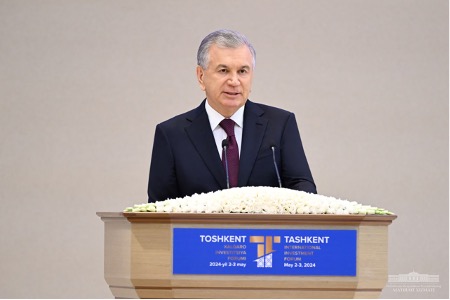 Dear participants of the forum! Dear participants of the forum!
Ladies and gentlemen!
At the outset, let me sincerely welcome you at the third Tashkent International Investment Forum.
I would like to note with pleasure that within the framework of this format, which is becoming a great annual tradition, new and reliable partners from all continents of the world are gathering in our country. Over the past three years, this Forum has provided a broad platform for enhancing collaboration, discussing pressing issues, and generating fruitful ideas and solutions to tackle the most urgent challenges.
READ MORE
Central Asian countries and the Gulf Cooperation Council: synergy of potentials[Over]  Uzbekistan, and Tashkent in particular, is becoming the venue for an important international forum that should give a practical vector to a new format of interregional cooperation based on the traditions of centuries-old exchanges between the peoples of Central Asia and the Arab States of the Gulf and today's huge potential for mutually beneficial co-operation. Uzbekistan, and Tashkent in particular, is becoming the venue for an important international forum that should give a practical vector to a new format of interregional cooperation based on the traditions of centuries-old exchanges between the peoples of Central Asia and the Arab States of the Gulf and today's huge potential for mutually beneficial co-operation.
The first ministerial meeting of the Gulf Cooperation Council-Central Asia Strategic Dialogue was held on 7 September 2022 in Riyadh, the capital of Saudi Arabia.
READ MORE
|
|